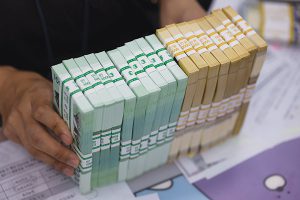Bloomberg
South Korea’s won is seen strengthening further after bouncing back from a 13-year low to become Asia’s best-performing currency, as the outlook for global trade improves for the major exporting nation.
The won has climbed 6% against the dollar this month, the biggest rise among major Asian currencies, amid expectations of softer rate increases in the US and China’s pivot away from its Covid Zero policy. Oil price’s retreat from this year’s highs may also help narrow the trade deficit in an economy dependent on fuel imports.
Yuanta Securities Co. sees the won strengthening above 1,300 a dollar following an excessively weak year, from around 1,340 last week, while Societe Generale SA expects it to continue to outperform regional peers such as the Taiwan dollar and the onshore yuan. The won has rebounded after slumping to become Asia’s worst-performing currency against the dollar last quarter.
“We now see a trend of strength in the won, and cautiously believe it has bottomed out,†said Park Sang-hyun, an economist at HI Investment & Securities Co. Oil prices are likely to stabilize after winter, which should narrow the trade deficit, while the Fed is expected to halt policy tightening next year, he said, forecasting the currency rising to as high as 1,200 per dollar.
If the Bank of Korea decides to place more emphasis on supporting the economy than capping inflation by delivering a 25 basis point rate increase this week, instead of a 50 basis point hike, that may actually give further support to the won, Societe Generale strategists Oh Suktae and Seong
Kiyong wrote in a note.
Still, the currency’s path to recovery will probably be a bumpy ride as uncertainty remains on the Fed’s monetary policy path and the nation’s sluggish property market — apartment prices in Korea recorded their fastest weekly drop on record last month as rising interest rates discourage potential buyers.
“The won may end stronger by next year, but there is chance for another plunge before that as we see the housing market come down,†said Kim Hyojin, an economist at KB Securities Co.
Meanwhile, Goldman Sachs said it’s bullish on the South Korean won and Singapore’s dollar. Among the high-yield markets in Asia, it’s “most constructive†on the Indonesian rupiah, given the nation’s improved external position and record low foreign holdings. It expects the currencies of Malaysia, India and Philippines to underperform.
 The Gulf Time Newspaper One of the finest business newspapers in the UAE brought to you by our professional writers and editors.
The Gulf Time Newspaper One of the finest business newspapers in the UAE brought to you by our professional writers and editors.
